Constellations, Duke of York’s Theatre, London

“One relationship, infinite possibilities” is the publicity phrase for Nick Payne’s sparkling two-hander, seen earlier this year at the Royal Court and now concluding the Court’s terrific West End season before no doubt scooping several awards.
So why only three stars? The dazzle of the on-off love affair between Sally Hawkins’s Sussex University cosmologist, Marianne, and Rafe Spall’s affable beekeeper, Roland, was more affecting and surprising first time round in the Court’s little upstairs studio, where it was danced out in the middle of us in beautiful geometric patterns. There’s now a more deliberate tread about Michael Longhurst’s 70-minute production and far less mobility. As each scene with variations is played out, sometimes turning on a single phrase or inflection, so the molecular pattern of spherical lights fuses and recharges like a rocket whoosh.
This creates a portentousness the writing doesn’t have. In addition to which, the end-staging roots each actor to the spot for minutes on end.
But this is a delightful pairing, Hawkins all bubble and squeakiness, Spall warm and cuddly, just half a step behind his partner’s vivacious impetuosity. Halfway through, Roland defines for Marianne the three different kinds of bees, each with their own specific purpose. “If only we could understand why it is that we’re here and what it is that we’re meant to spend our lives doing.”
The bee speech is recited three times with three different outcomes. The idea of no fixed meaning comes from Marianne’s special knowledge of quantum multiverse theory. And that sets the rules of engagement, or lack of them, as the dialogue has a revue-style, experimental flavour that suggests this is a linguistic exercise as much as an intellectual one.
Nick Payne himself, while granting that the uncertainty, or chemical volatility, in the play is a vital component of quantum theory, traces the impulse behind writing it to the death of his father, and there’s a strain of mortality and inevitability that is established early on and against which the subsequent joie de vivre seems to grate.
The couple meet at a barbecue, go their separate ways, meet again by chance, make another go of it. The play could end anywhere and does, except for the sadness buried somewhere along the way, which gives the finality of a theatre event a lingering, tingling potency. It’s the very opposite of Beckett, but a piece of classical pessimism just the same.
To 5 January (0844 871 7677)
Subscribe to Independent Premium to bookmark this article
Want to bookmark your favourite articles and stories to read or reference later? Start your Independent Premium subscription today.

Join our commenting forum
Join thought-provoking conversations, follow other Independent readers and see their replies